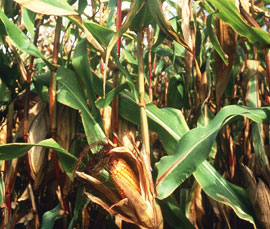Protesters refuse to back down on GM crop trashing plans

Protesters who threatened to destroy a genetically modified wheat crop trial say they have no intention of backing down, despite calls from scientists to allow the experiments to go ahead.
Anti-GM group Take the Flour Back said it was left with no choice than to “decontaminate” the trial site at Rothamsted Research unless the GM crops were removed by the government or scientists before 27 May.
Responding to an open letter written earlier this week by scientists urging it not to ruin their experimental plots, the group welcomed the opportunity to hold a neutral, public debate with scientists over its concerns about the technology.
But it said it did not agree with claims made by the researchers that the GM wheat being trialled would reduce pesticide use.
It said testing the crops in the open air put UK farming and the environment at risk and that planting the trial next to Rothamsted’s classical grassland experiment was reckless and undermined the institution’s credibility.
“We are not in a minority with our fears with our fears over this trial and the potential commercial introduction of GM wheat that could follow,” the group said.
“EU surveys show that the majority of the public still don’t trust GM food.
“In planting the GM wheat, you have shown total disregard for the reasonable concerns of the public at large, who say they don’t want to eat GM and do not want to be treated as guinea pigs.
“You ask us not to pull up the GM wheat. We ask you not to recklessly endanger livelihoods and our food supply by letting it remain in the open air.
“We do not believe that it should be lawful for you to spread contamination in this way. If the government refuses to take responsibility for this problem, then we are left with no other choice.”
Colin Ruscoe, chairman of the British Crop Production Council, said Take the Flour Back’s proposed illegal actions were an unjustified attack on an experiment which had been carefully researched and controlled.
“It is also a general attack on scientific advances aiming to meet one of the world’s biggest challenges – providing safe and nutritious food for a growing global population, whilst reducing the environmental impact of production.”
Dr Ruscoe said the group’s key argument for attacking the crop over concerns about contamination of neighbouring wheat crops.
But as wheat was a self-pollinating plant with heavy pollen, the pollen only travelled short distances and was short lived.
“The experiment involves using extensive ‘trap crops’ and herbicides to prevent cross-pollination,” he added. “One objective of the trial is to investigate the extent to which any genetic material from the plants persists in the soil.”
For more on this topic
Join in the conversation on our GM forum
